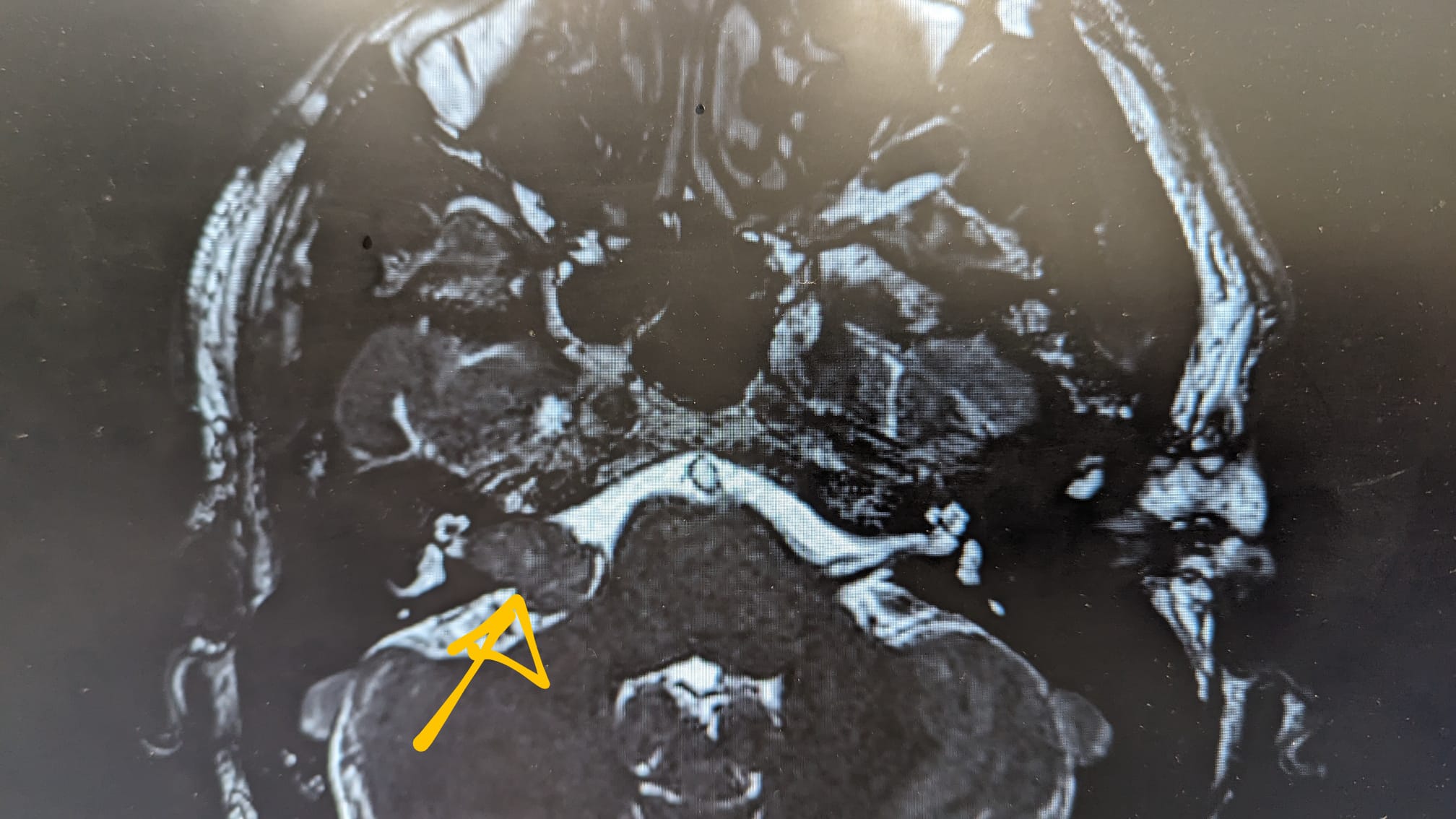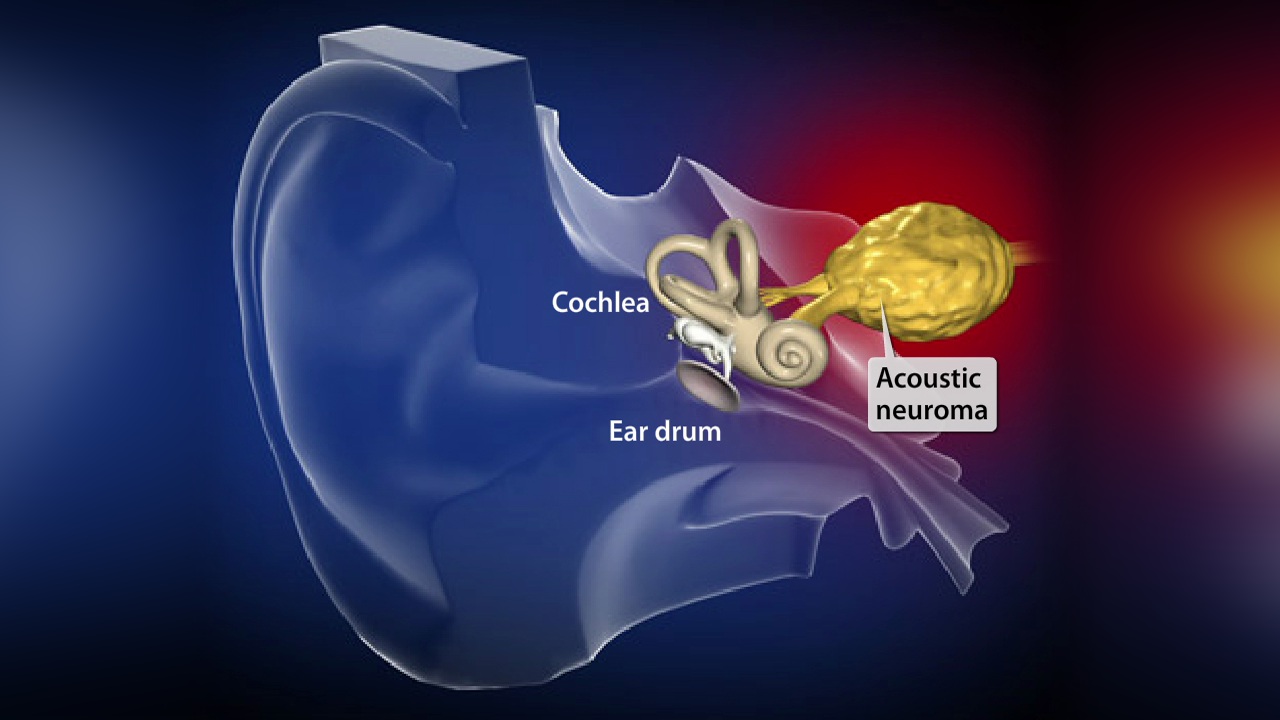
My Acoustic Neuroma Diagnosis Journey: From Subtle Symptoms to Life-Changing Clarity
Life’s small signals are easy to ignore. At first, it was a struggle to hear conversations in crowded spaces, and then there was the constant ringing in my right ear. The tinnitus, like a persistent background noise, made me realize that something wasn’t right. This blog post is about how these subtle symptoms led me to a life-altering diagnosis: an acoustic neuroma.
June 27th, 2022: A Hearing Test at Boots
After months of noticing my hearing decline, I decided to get a hearing test at Boots. I was hoping for a simple explanation—maybe earwax buildup. Instead, the test revealed 50% hearing loss in my right ear. I was immediately referred to my GP, and that was when I realized something more serious could be at play.
June 9th, 2022: Referral to ENT
I spoke to my GP on June 9th, and they referred me to the ENT department for further investigation. While I waited, I began noticing more frequent tinnitus in my right ear—a ringing that never seemed to go away. Tinnitus is often associated with hearing loss, but little did I know it was tied to something much bigger.
September 26th, 2023: ENT Appointment and MRI Referral
Over a year later, I finally had my appointment at Kidderminster Hospital’s ENT department. The specialist examined me and referred me for an MRI scan, which felt like a big step forward in finding out what was going on. An MRI was ordered to look for potential causes, one of which I had read about: an acoustic neuroma.
The MRI confirmed the presence of a 19 x 13 x 12 mm tumor located on the right cerebellopontine angle. This is the area where the cerebellum and brainstem meet, a critical region for balance and hearing. The size and location of the tumor were responsible for my symptoms—especially the constant tinnitus in my right ear and the significant hearing loss.
December 6th, 2023: Diagnosis Confirmed
I received my diagnosis from Mr. Monkfield at the Centre for Rare Diseases on December 6th, 2023. It was a lot to take in—an acoustic neuroma, a benign tumor on the vestibulocochlear nerve, which is responsible for both hearing and balance. It’s not cancerous, but its position and size made it a serious issue. The tumor was growing in a region where it could press on crucial nerves and possibly affect facial movement if left untreated.
An acoustic neuroma, also known as a vestibular schwannoma, is a benign, slow-growing tumor that develops on the vestibulocochlear nerve. This nerve plays a crucial role in transmitting sound and balance information from the inner ear to the brain. The tumor arises from the Schwann cells, which form the protective lining around nerves. While acoustic neuromas are non-cancerous and typically grow slowly, their location can lead to serious complications over time.
Characteristics of an Acoustic Neuroma:
- Benign: Acoustic neuromas are not malignant, meaning they don’t spread to other parts of the body. However, their position near important cranial nerves can cause significant symptoms.
- Slow-growing: These tumors often develop over several years. Because of this, symptoms can appear gradually and may go unnoticed for a long time.
- Common Symptoms: Hearing loss in one ear, tinnitus (ringing in the ear), and balance issues are the most common symptoms. Some people also experience a feeling of fullness in the affected ear or dizziness.
While the tumor itself is benign, the pressure it exerts on nearby nerves can lead to complications. If left untreated, larger acoustic neuromas can press against the brainstem, which can be life-threatening.
How Acoustic Neuromas Can Affect Lives
Living with an acoustic neuroma can have a profound impact on daily life. For some, the tumor may cause only mild symptoms that are easily managed, but for others, the effects can be far more disruptive:
Hearing Loss: As the tumor presses on the vestibulocochlear nerve, hearing loss in the affected ear is common. This hearing loss is often irreversible, even if the tumor is treated. It can make communication difficult, especially in noisy environments, leading to social isolation or challenges at work.
Tinnitus: Constant ringing or buzzing in the ear, known as tinnitus, can be exhausting and lead to stress or sleep disturbances. It’s a persistent noise that only the affected person can hear, making it a challenging symptom to cope with.
Balance Issues and Dizziness: The vestibulocochlear nerve also controls balance, so when the tumor affects this area, individuals may experience dizziness, unsteadiness, or even vertigo. This can make everyday activities like walking or driving difficult, and can increase the risk of falls.
Facial Nerve Impact: In some cases, if the tumor grows large enough, it can press on the facial nerve, causing weakness, numbness, or even paralysis on one side of the face. This can affect facial expressions, swallowing, and speech.
Emotional and Psychological Impact: Beyond the physical symptoms, living with an acoustic neuroma can take an emotional toll. Anxiety about the tumor’s growth, the potential for hearing loss, or the need for surgery can lead to stress and depression. The constant tinnitus and balance issues may also contribute to feelings of frustration or helplessness.
What Happens Next? A Repeat MRI and Monitoring the Tumor
Following my diagnosis, the next step was a repeat MRI to monitor the tumor’s growth and assess its direction. Acoustic neuromas often grow slowly, but tracking its growth is key to determining treatment. My tumor is already a considerable size at 19 x 13 x 12 mm, and its position in the right cerebellopontine angle could affect more than just my hearing.
Next Steps: Monitoring Growth and Potential Treatments
For
tumors like mine, treatments typically depend on their size and growth
rate. Options range from monitoring with regular MRIs to surgical
removal or radiosurgery if the tumor grows or causes severe symptoms. At
present, the plan is to determine how much and in which direction it’s
growing before making any big decisions.
The journey from noticing small hearing issues to receiving a diagnosis of a tumor in my brain has been a whirlwind. But it’s also a reminder of how important it is to pay attention to the body’s signals. What started as subtle hearing loss and tinnitus turned out to be something far more significant.
Acoustic neuromas are rare, affecting about 1 in 100,000 people. While they are benign, their location near the brain and nerves can cause serious symptoms over time. For me, the diagnosis answered a lot of questions but also opened the door to new uncertainties—what does the future hold? Will the tumor grow? Will I need surgery?
I don’t have all the answers yet, but I’m grateful for the clarity the diagnosis has brought. And I know the importance of being proactive with my health moving forward.
Key Takeaways
- Hearing loss and tinnitus should never be ignored. Early symptoms can indicate more serious underlying issues.
- Acoustic neuromas grow slowly but can still cause significant problems. Regular monitoring and early detection are key to managing the condition.
- MRI scans provide crucial insight into the size and location of tumors like acoustic neuromas, helping guide treatment options.
If you’re experiencing similar symptoms or just want to know more, here’s a helpful resource: Acoustic Neuroma Overview from the NHS.
Sharing my story has been cathartic, and I hope it helps others who might be on a similar journey. If you have questions or want to share your own experiences, feel free to comment below—let’s support one another through these unexpected turns in life.
Please share this article if you like it!
I’m a fitness enthusiast and Peloton addict who loves challenging limits through races, paddleboarding, and life’s adventures. Here, I share milestones, reflections on Acoustic Neuroma, and stories of resilience and growth.




No Comment! Be the first one.